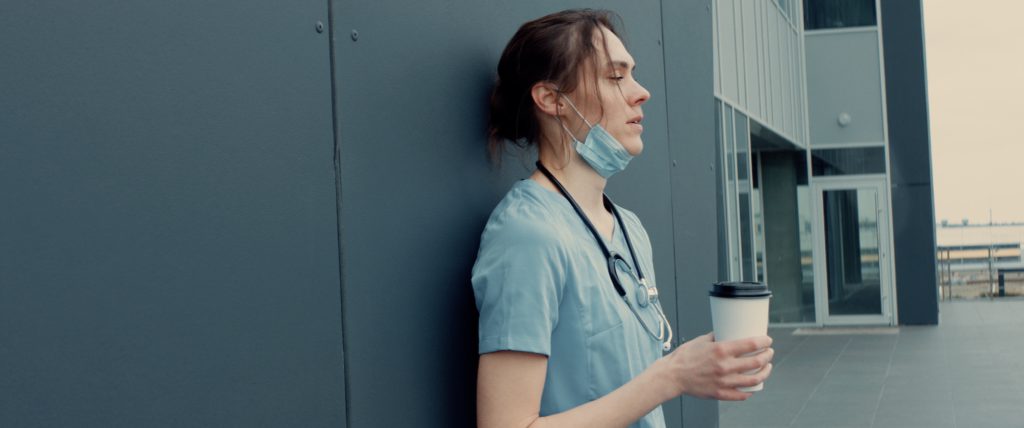Here are some Holistic Nursing tips for managing stress and avoiding overwhelm at work.
Holistic Nursing Tips and Self-care Strategies
- Gratitude–creates a more relaxed body state and helps to relieve stress. There’s always something to be grateful for. Name it. If you set out to find something to be grateful for, you will spend your time seeing opportunities for gratitude.
- Self-acceptance – Most people experience self-doubt. You don’t have to believe that you are inadequate. Your mistakes and flaws don’t define you. Value your value. Be a friend to yourself.
- Emotional expression–Express yourself. Look for opportunities to engage in crying and/or laughing. Acknowledge the feelings.
- Stretching – is available almost all the time. It helps relieve stress. There are lots of ways to stretch that can be done anywhere in just a moment or two.
- Go for a walk. Even if it’s just two minutes in the hall. Changing the setting might help.
- The 5-second rule. Count backward from 5 to 1 to refresh your thoughts. You can use it as a countdown to start something that you are hesitant about.
- Affirmation. These are positive statements. “I/We are doing the best job we possibly can with the resources we have.” “I am making a difference.” “I choose calm over anxiety.”
- Somatic awareness helps people process stress. Focus intently on a body part. For example, note how your hands feel when you wash them. Listen to your hands. Are they trying to tell you something? Practice noting inputs from all of your senses.
- Stay hydrated. Dehydration causes stress and stress can further dehydration.
- Look out the window. Viewing a natural environment–maybe it’s just the sky–relieves environmental stress.
- Aromatherapy sticks can be kept in your pocket. Apply lotion to your hands,
- Try hugging yourself. It can lower your cortisol levels and relieve some of your tension and stress.
- Breathing – spend a few minutes just being aware of your breathing. Close your eyes or just gaze into space. Take a deep, cleansing breath. Try alternate nostril breathing. Release any intrusive thoughts. “Breathing in, I control what I can control. Breathing out, I release what I cannot control.”
- Eat lunch. Eating is a stress-reduction strategy. Skipping meals contributes to stress. Sometimes high magnesium food such as dark chocolate and pumpkin seeds help people to destress. Consider choosing decaf. Take a few minutes to focus on the experience of receiving nourishment as a form of self-care. Beware of emotional eating–trying to fill an emptiness that is not hunger.
- Guided imagery can be an effective stress reducer. Think about your ‘happy place’ in all of its sensory details. When you “come back”, you will feel a bit better.
- Self-compassion lowers cortisol levels. Acknowledge your pain and anger without judging yourself. You are a human being having human experiences. Don’t belittle them. Accept them as part of life. How can you show yourself kindness in this time and place?
Short on time and looking for more holistic nursing tips?
See 5 Holistic Nursing Practices that take 5 minutes or less

Amy Kenefick Moore started her nursing career with Neonatal Intensive Care nursing and then became a Certified Nurse Midwife, practicing in Boston MA and Providence RI. She was a nurse practitioner in a large long-term care facility in western MA for nearly a decade before she joined the faculty at the University of Connecticut School of Nursing. She also held a joint appointment at the UConn School of Medicine. She has a PhD in Nursing and did a post-doctoral fellowship at Yale’s Center for Excellence in Chronic Illness Care.
In addition to being a Certified Nurse Midwife and Family Nurse Practitioner, she is certified as an Advanced Practice Holistic Nurse and a Health and Wellness Nurse Coach. She was in INCA cohort #18. Her nurse coaching training included a focus on the end of life.
Her nursing practice has been about quality of life throughout the lifespan. Both her long career in nursing and her personal life have taught her that it’s never too late to make things better than they would have been.
What can be made better and how that happens depends on the teamwork between the nurse and the client. A kind of magic happens as the possibilities unfold and the results emerge.
Amy has published research and stories about the human experience of health and illness. Her work in nursing theory development focuses on the nurse-client relationship and on practice models based on the concept of the sustaining presence of the nurse.
Sometimes the nurse’s client is a student and she has done research and theory work about the use of storytelling in that context. She believes that the nursing faculty role is an ideal situation in which to demonstrate the fine art of nursing practice.
Her coaching clients are often people who have had successful professional careers and are now faced with some kind of health-related situation. Sometimes the client is the person who has the condition and sometimes it’s their friend or family member. Sometimes clients are nurses who deal with health situations for a living.
Amy’s work is about helping people develop a practical understanding of their situation, identify personal goals and make changes in their lives. A priority is to stop the overwhelm and make it doable. Sometimes this even means figuring out the best thing that could happen and then going one step further. When that happens, it’s magical!
- Amy Kenefick Moore PhD RN APRN-BC HWNC-BC APHN-BC
- Amy Kenefick Moore PhD RN APRN-BC HWNC-BC APHN-BC






